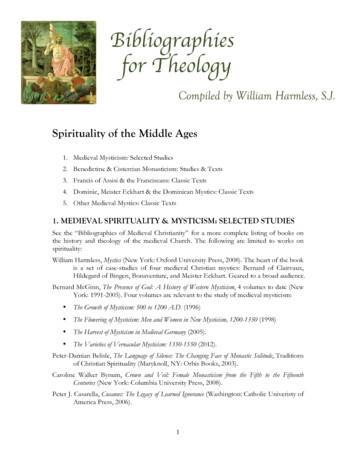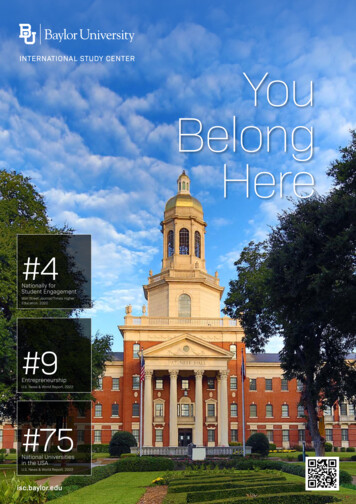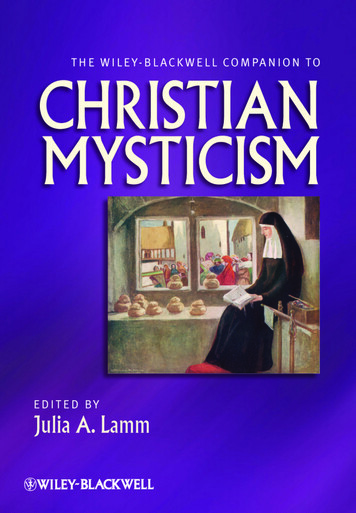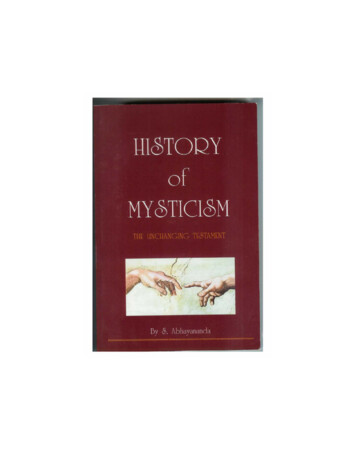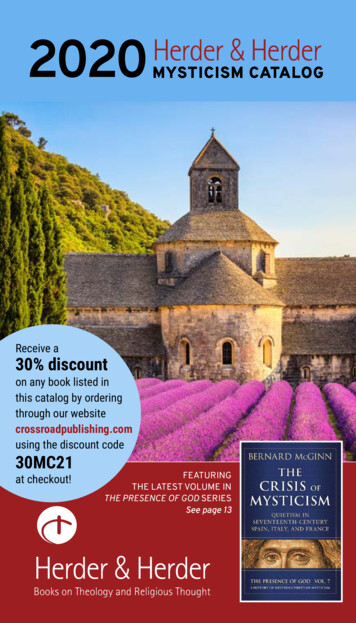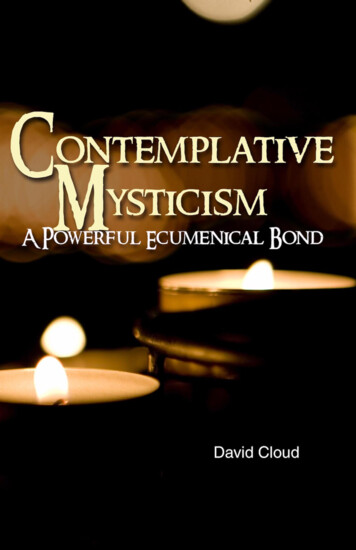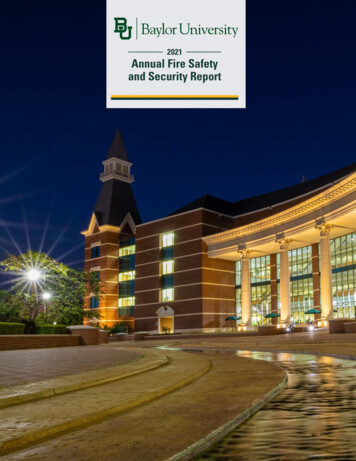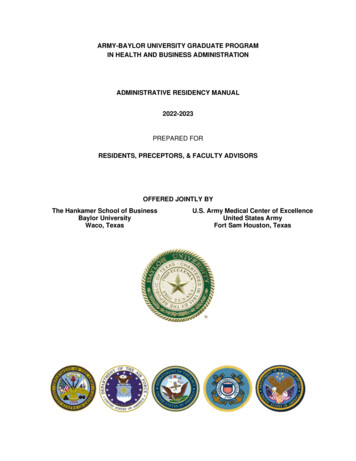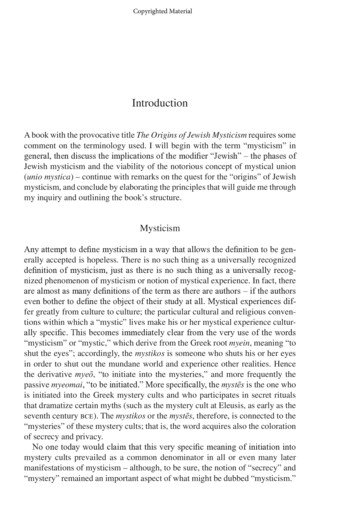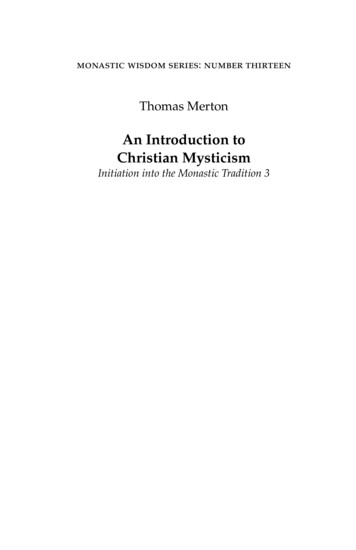
Transcription
Study Guides forMysticismChristian ReflectionA Series in Faith and EthicsThese guides integrate Bible study, prayer, and worship to helpus explore the mystics’ invitation “to walk into the world and beunleashed to care unselfishly.” Use them individually or in aseries. You may reproduce them for personal or group use.What is a Mystic?2To dwell in God’s love is an experience that lures andinvites us. We hear of remarkable people—in the Bibleand elsewhere—who pour themselves out for God. Butcan we be like them? What is the cost of coming so closeto God that we want to give our lives to him? Will we bewilling to pay it?How Mystics Hear the Song4Mystics show the power of the Song of Songs to shape ourunderstanding of life with God and give us hope that ourlanguishing love can be transformed into radical eros—adeep yearning that knows only the language of intimatecommunion, the song of the Bridegroom and his Bride.Loosening Our Grip6Julian of Norwich offers an alternative to our desire tocontrol the world: What if the cross and resurrection ofJesus really define the pattern of divine action in humanhistory? What if compassion, understood as the embraceof suffering, is the soil from which human action shouldgrow? Then, perhaps, we could begin to loosen our deathgrip on the reins of history.Prophetic Mysticism8Simone Weil is a brilliant example of a Christian whoembodied both the mystical and prophetic elements of thefaith. If her ideas offer us glimpses of the import of justice,her life more fully discloses its meaning. Her passion fortruth and justice can ignite a spark in our hearts.Christian ReflectionCenter for Christian EthicsBaylor UniversityOne Bear Place #97361Waco, TX 76798-7361Phone 1-866-298-2325www.ChristianEthics.wsThe Center thanks theCooperative Baptist Fellowship for its financial supportof these study guides. 2005 The Center for Christian EthicsThe Mystic and the Church10Evelyn Underhill attempted to reconcile the inherenttension between mysticism and institutional religion. Hersympathy for mysticism nuanced her understanding ofwhat it means to participate in the Body of Christ and wasthe basis for her ongoing critique of the foibles of the“visible church.”Improving our Seeing and ListeningWe must admit that we are not good at listening to Godand seeing the world as God sees. Our culture does nothelp: it catches us up in busyness and distracts us withraucous noise and glaring lights. How will we recover ourattentiveness which is essential to serving God in today’sworld?121
What is a Mystic?Christian ReflectionA Series in Faith and EthicsFocus Article:Toward a Deeper andGodlier Love(Mysticism, pp. 11-19)Suggested Article:Do You Love Me?(Mysticism, pp. 63-66)Meeting ChristianMystics(Mysticism, pp. 85-88)What do you think?Was this study guide usefulfor your personal or groupstudy? Please send yoursuggestions toChristian Reflection@baylor.eduChristian ReflectionCenter for Christian EthicsBaylor UniversityOne Bear Place #97361Waco, TX 76798-7361Phone 1-866-298-2325www.ChristianEthics.ws 2005 The Center for Christian EthicsTo dwell in God’s love is an experience that lures and invites us.We hear of remarkable people—in the Bible and elsewhere—whopour themselves out for God. But can we be like them? What isthe cost of coming so close to God that we want to give our livesto him? Will we be willing to pay it?PrayerScripture Reading: Ephesians 3:14-21Responsive ReadingGrace and peace to you in the name of the Lord our God.We come together before God, whose vastness is beyond ourknowing but in whom we are fully known.Grace and peace to you in the name of our savior, JesusChrist.We gather in the name of Christ, who lived and died amongus, imparting life to each of us.Grace and peace to you, by the living power of the HolySpirit.We open our hearts to this Eternal Spirit, who moved overthe face of the deep and who is with us now.Reflection“To speak of mystics today is to risk misunderstanding,” EmilieGriffin warns. “Many Christians (mistakenly, I think) associatemystics exclusively with cults and Eastern religions, ignoring ourlong Christian centuries of intimate union with God in JesusChrist. Such a view is too limited. In biblical history, in the earlyChristian communities, in later Christianity, and in the church oftoday, mysticism still matters, for it brings us close to God whowhispers and guides.”Bernard McGinn defines Christian mysticism as a form ofspirituality that “concerns the preparation for, the consciousnessof, and the reaction to the immediate or direct presence ofGod.” Mystics describe their experience in various ways—asunion or communion with God, ecstasy or intimacy, seeingvisions or hearing voices, and so on.Nevertheless, Griffin suggests, “there are many quiet, unrecognized mystics, mystics who fly below the radar. They are closeto God, transformed by that relationship, but may never looklike ‘mystics’ in the eyes of others. In fact, being a mystic haslittle to do with visions or ecstasies. Instead, a mystic is a personfar advanced in the spiritual life, one who very likely spendstime in prayer and worship with a disciplined regularity.Wouldn’t such a definition include a large number of people?”To clarify the nature of Christian mysticism, she emphasizesthree ideas: Intimacy with God is a gift. “The mystics do not ask to be mystics,” and they offer us no spiritual algorithm to manipulateGod’s presence. Mysticism is not magic. Instead, the mysticswait humbly before God: “They admit their flaws and sinfulness, their need of God’s redeeming grace. They come as beggars to the throne, not saying, ‘Lord, please make me a mys-2
Christian ReflectionA Series in Faith and Ethicstic,’ but rather, ‘Lord, I want to know you better.’” The mystics invite us to open ourselves to the spiritual life, includingChristian forms of meditation and prayer. Yet “we should notattempt the spiritual life as if we could (under our own steam)achieve a high level of greatness,” Griffin warns. “Although acertain discipline is good, spiritual transformation dependsupon the grace of God and comes as pure gift.” Our experiences of God are diverse. Many Christians have suggested a path in the spiritual life, from awakening to purgation, illumination, and union. “The idea of recognized stagesis reassuring, but it should not be confining,” she writes, for“the grace of God is highly unpredictable. God’s plan for eachperson is unique to that person.” Mystics need to “think with the church.” Some Christians areexperimenting with spiritual techniques from other religioustraditions. Griffin finds wisdom in the letter to bishops titled“Christian Meditation,” which counsels caution in using thesetechniques. “From the earliest times, these church fathersseem to be saying, the church has advised the practice ofsentire cum ecclesia—that is, thinking with the church,” shewrites. “Spiritual masters or guides, following this practice,warn and caution their pupils against inappropriate teachingsand practices; at the same time, the spiritual master leads hisor her pupil into the life of prayer by example, heart to heart,seeking always the guidance of the Holy Spirit.”God proclaims, “I have loved you with an everlasting love”(Jeremiah 31:3). The mystics, Griffin says, “are experiencing itand giving witness of that intense love and friendship. Theyinvite us to come closer to God, to risk experiencing such love,to be transformed by God’s affections.”Study Questions1. The term “mystic” was not used until A.D. 500. However,which biblical figures encountered God intimately and directly in what might be called “mystical experience”?2. Who are some Christian mystics over the ages? Have youbenefited from their writings or experiences?3. According to Griffin, why are we wary of mysticism? Do youhave other worries about Christian mysticism?4. What does Thomas Merton mean by “masked contemplation”? How is it “an ordinary or hidden mysticism”?Robert B. Kruschwitz, the author ofthis study guide, directs TheCenter for Christian Ethics atBaylor University. He servesas General Editor of ChristianReflection. 2005 The Center for Christian Ethics5. What aspects of the mystics’ experience do we deeply desireaccording to the hymn “Our Deepest Prayer”? Do you agree?6. Discuss Brent Beasley’s suggestion that Christian ministersand deacons and teachers should be more like mystics thanprophets. He quotes Henri Nouwen approvingly: “The centralquestion is, Are [they] truly men and women of God, peoplewith an ardent desire to dwell in God’s presence, to listen toGod’s voice, to look at God’s beauty, to touch God’s incarnateWord and to taste fully God’s infinite goodness?”7. For Beasley, in what sense is Jesus’ question, “Do you loveme?” an invitation to a mystical encounter with God?Departing Hymn: “Our Deepest Prayer”3
How Mystics Hear the SongChristian ReflectionA Series in Faith and EthicsFocus Article:How Mystics Hear theSong(Mysticism, pp. 20-28)Suggested Article:Yearning for God(Mysticism, pp. 60-62)Mystics show the power of the Song of Songs to shape ourunderstanding of life with God. They give us hope that ourlanguishing love can be transformed into radical eros—a deepyearning that knows only the language of intimate communion,the song of the Bridegroom and his Bride.PrayerScripture Reading: Song of Songs 1:1-4; 2:3-5Responsive Reading: Psalm 34:8-14O taste and see that the LORD is good;happy are those who take refuge in him.O fear the LORD, you his holy ones,for those who fear him have no want.The young lions suffer want and hunger,but those who seek the LORD lack no good thing.Come, O children, listen to me;I will teach you the fear of the LORD.Which of you desires life,and covets many days to enjoy good?Keep your tongue from evil,and your lips from speaking deceit.Depart from evil, and do good;seek peace, and pursue it.ReflectionWhat do you think?Was this study guide usefulfor your personal or groupstudy? Please send yoursuggestions toChristian Reflection@baylor.eduChristian ReflectionCenter for Christian EthicsBaylor UniversityOne Bear Place #97361Waco, TX 76798-7361Phone 1-866-298-2325www.ChristianEthics.ws 2005 The Center for Christian Ethics“What makes this congregation so different?” Vicki and I askedthe pastor of the appealing church we were about to join. “We’researching for a deeper, richer tradition,” he began. “We’re asking what Christians were doing more than a few hundred yearsago, and letting that shape our worship and what we studytogether.”As Dennis Tucker notes, we may be surprised to learn whatour ancestors in the faith read and how it informed their discipleship. Christians in the Middle Ages studied the Song ofSongs—a book that scandalizes us with its erotic language andsexual innuendos—and allowed it to teach them to love God.They wrote more “commentaries” on it than any other OldTestament book. How did the medieval mystics hear the Song? They listened to the Song “with the ear of our hearts.” That is howBenedict describes lectio divina (or divine reading)—a carefullistening to a short passage of Scripture read aloud severaltimes, separated by silence. The “commentaries” by Bernardof Clairvaux and Teresa of Avila are devotional reflectionsbased on such a reading. Bernard says his goal is not so much“to explain words as it is to influence hearts,” because a meditative reading of the Song can “teach thirsting souls how toseek the one by whom they themselves are sought.” They identified with the context of the Song. “The wedding dayenvisioned in the Song became symbolic of the monastic life”especially, and Christian life generally, writes Tucker. “All oflife is a liminal moment—living in this world, yet longing forthe next. The language of anticipation and fulfillment in the4
Song was an ideal vehicle for expressing the tension between the ‘now’ and the ‘not yet’ of the spiritual life.”Christian ReflectionA Series in Faith and Ethics They let the Song’s words reshape their view of life with God. We areinexperienced in loving God, Teresa laments. The Song rekindles our love even as it teaches us to express it. “Alonghow many paths, in how many ways, by how many methodsYou show us love!” she writes. “[Not] only with [Your] deedsdo You show this love, but with words so capable of wounding the soul in love with You that You say them in this Song ofSongs and teach the soul what to say to You.”John of the Cross, rather than writing a commentary on theSong of Songs, “weaves together the words of Scripture with thewords from previous Christian writers into a powerful prayerthat expresses the intensity of his love for God.” His remarkablepoetry models the spiritual life for us, for as we dwell with theSong and with these medieval sisters and brothers, Tucker concludes, “we will find our own voice in this journey toward love.”Study Questions1. What is the difference between an informational reading ofScripture and a formational reading? Do we need one or theother, or both? How would you study Scripture in each way?2. Medieval interpreters believed the Bible has layers of meaning. Discuss what they called the “fourfold meaning of Scripture.” Do you agree the Bible has these layers of meaning?3. The relation between faith and works, or God’s grace and ourmoral efforts, is difficult to understand. How does Bernard ofClairvaux approach this puzzle in the quote that begins, “Icould not perceive the exact moment of his arrival” (p. 22)?How does John Newton address the problem in the sixthverse of “How Sweet the Name of Jesus Sounds”?4. In Canticle 34-39 by John of Cross (p. 26), what insights do youfind into our love for God?5. Read the report by Teresa of Avila of the “transverberation”(p. 61), the event portrayed in Bernini’s The Ecstasy of St.Teresa. Can we learn anything from Teresa’s unusual vision, ordoes it simply make her a religious eccentric?Departing Hymn: “How Sweet the Name of Jesus Sounds” (verses 1, 5, and 6)How sweet the Name of Jesus soundsin a believer’s ear!It soothes his sorrows, heals his wounds,and drives away his fear.Robert B. Kruschwitz, the author ofthis study guide, directs TheCenter for Christian Ethics atBaylor University. He servesas General Editor of ChristianReflection.Jesus! my Shepherd, Husband, Friend,O Prophet, Priest, and King,My Lord, my Life, my Way, my End,accept the praise I bring. 2005 The Center for Christian EthicsJohn Newton (1779), alt.Tune: ST. PETER (Reinagle)Weak is the effort of my heart,and cold my warmest thought;But when I see you as you are,I’ll praise you as I ought.5
Loosening Our GripChristian ReflectionA Series in Faith and EthicsJulian of Norwich (1342-c.1416) offers an alternative to our desireto control the world: What if the cross and resurrection of Jesusreally define the pattern of divine action in human history? Whatif compassion, understood as the embrace of suffering, is the soilfrom which human action should grow? Then, perhaps, we couldbegin to loosen our death grip on the reins of history.PrayerScripture Reading: Colossians 1:15-20Response to the Scripture†Focus Article:Loosening Our Grip(Mysticism, pp. 29-36)I, God, am in your midst. Whoever knows me can never fall,not in the heights, nor in the depths, nor in the breadths,for I am love, which the vast expanses of evil can never still.ReflectionIn an era so filled with war, disease, and religious splinteringthat it was every bit as calamitous as our own, a remarkablewoman known as “Julian of Norwich” reflected on fourteenvisions. Most involved the crucifix placed before her as part ofthe medieval rites for the dying. “In this crucifix, an image thatseems to sum up all of the pain and violence of the world, Juliansees an image of immense comfort because she sees in it an imageof divine love so all-encompassing that even human sin cannotmar its perfection,” explains Fred Bauerschmidt. The visionswere comforting, but also disturbing to Julian for “she had beentaught that God hated sinners and punished them, but her visions seemed to speak of a God who loved sinners and sought toheal the damage that sin inflicted upon them.” Yet she writes, “Isaw him and sought him; I had him and wanted him.”If we examine our lives and the world through the eyes ofJulian of Norwich, we gain new insight intoWhat do you think?Was this study guide usefulfor your personal or groupstudy? Please send yoursuggestions toChristian Reflection@baylor.eduChristian ReflectionCenter for Christian EthicsBaylor UniversityOne Bear Place #97361Waco, TX 76798-7361Phone 1-866-298-2325www.ChristianEthics.ws 2005 The Center for Christian Ethics Trusting God’s goodness. Behind our desire to control the worldthrough techniques, or “means,” that secure health and prosperity, Julian sees a fundamental distrust of God. “For Julian,the chief problem that we have is that we do not believethat God loves us sufficiently to will our good,” Bauerschmidtnotes. “In other words, if we understood God correctly, wewould be freed both from our desire for control and from theunbearable anxiety from which that desire springs.”The misunderstanding of God against which Julian reactsmay be seen today in our approach to science and technology,he suggests. “To see the world as a self-contained system thatwe must ‘work’ through scientific investigation and technological manipulation is not primarily a philosophical mistake,but a spiritual one. It is a lack of trust that God wills good forus; it is the view that we are in some sense left on our own toeke out of nature whatever good we can.” Focusing on the Crucified. In the midst of terrorism, AIDS, andenvironmental devastation, how can we believe that God hasour best interests at heart, or that we are not simply left to“work” a natural system that God has left to run on its own?6
Is it not irresponsible to say with Julian, “All shall be well,and all shall be well, and all manner of thing shall be well”?In her vision of the crucified Jesus, Julian grasps that “Godrepairs the world’s pain by entering into that pain and healing our sad history from within through an act of love,” saysBauerschmidt. “The cross is the antidote to our desire to fixthings through our mastery of them. Julian devotes her life toletting this antidote work its way into her soul. But she alsorealizes that in this life we can never fully be healed of theblindness to God’s love that is the source of our desire tocontrol events. The final repair of fallen creation is a work ofGod that we hope for but cannot anticipate.”Christian ReflectionA Series in Faith and Ethics Acting in the world. Our action “should be modeled on theparadox of the cross: action shot through with passion, mastery expressed in taking on the form of a slave, and the fulfillment of human life found in the laying down of that life,”Bauerschmidt concludes. Julian asks us to “embrace the mystery of suffering, and it is only from within that embrace thataction can grow that truly accords with God’s love.”Study Questions1. What events today make it difficult for people to believe thatGod is wholly good? How might Julian respond?2. “All shall be well” runs counter to our self-image. In whatways do we have a “death grip on the reins of history”?3. Describe Julian’s critique of efforts to manipulate God withdevotion, or “religious techniques.” Is it still relevant?4. Julian says a Christ-like life is filled with compassion orsuffering-with. How is this different from appeals to compassion to support physician-assisted suicide, euthanasia ofdisabled newborns, stem cell research, or deposing a dictator?Departing Hymn: “Be Still, My Soul” (verses 1, 2, and 4)Be still, my soul: the Lord is on your side;bear patiently the cross of grief or pain;leave to your God to order and provide;in every change He faithful will remain.Be still, my soul: your best, your heavenly Friendthrough thorny ways leads to a joyful end.Be still, my soul: your God will undertaketo guide the future, as he has the past;your hope, your confidence let nothing shake;all now mysterious shall be bright at last.Be still, my soul: the waves and winds still knowhis voice who ruled them while he dwelt below.Robert B. Kruschwitz, the author ofthis study guide, directs TheCenter for Christian Ethics atBaylor University. He servesas General Editor of ChristianReflection.Be still, my soul: the hour is hastening onwhen we shall be forever with the Lord,when disappointment, grief, and fear are gone,sorrow forgot, love’s purest joys restored.Be still, my soul: when change and tears are pastall safe and blessed we shall meet at last. 2005 The Center for Christian EthicsKatharina A. von Schlegel (1752); trans. J. L. Borthwick (1855), alt.Tune: FINLANDIA†Hildegard of Bingen (1098-1179)7
Prophetic MysticismChristian ReflectionA Series in Faith and EthicsFocus Article:Prophetic Mysticism(Mysticism, pp. 37-46)Suggested Article:Surrounded by Witnesses(Mysticism, pp. 58-59)Simone Weil (1909-1943) is a brilliant example of a Christian whoembodied both the mystical and prophetic elements of the faith.If her ideas offer us glimpses of the import of justice, her lifemore fully discloses its meaning. Her passion for truth andjustice can ignite a spark in our hearts.PrayerScripture Reading: 1 Corinthians 1:18-25Meditative ReadingLove bade me welcome: yet my soul drew back,guilty of dust and sin.But quicked-ey’d Love, observing me grow slackfrom my first entrance in,drew near to me, sweetly questioning,if I lack’d any thing.A guest, I answer’d, worthy to be here:Love said, You should be he.I the unkinde, engrateful? Ah my deare,I can not look on thee.Love took my hand, and smiling did reply,who made the eyes but I?Truth Lord, but I have marr’d them: let my shamego where it doth deserve.And know you not, sayes Love, who bore the blame?My deare, then I will serve.You must sit down, sayes love, and taste my meat:so I did sit and eat.†ReflectionWhat do you think?Was this study guide usefulfor your personal or groupstudy? Please send yoursuggestions toChristian Reflection@baylor.eduChristian ReflectionCenter for Christian EthicsBaylor UniversityOne Bear Place #97361Waco, TX 76798-7361Phone 1-866-298-2325www.ChristianEthics.ws 2005 The Center for Christian EthicsAs the young social activist Simone Weil (pronounced “vey”) wasmeditating on George Herbert’s poem for comfort during herviolent headaches in 1938, its words became a prayer on her lips.“During one of these recitations,” she says, “Christ himself camedown and took possession of me.” The consequences of thismystical experience were profound, Alex Nava writes, “but onepotential implication certainly did not follow: namely, an abandonment of her commitment to social justice. Hers was not adualistic spirituality; her concern for addressing the materialneeds of the human spirit was just as passionate as before herreligious transformation, only now it was more consciously related to an awareness of the presence of the crucified Christ inthe faces of the afflicted.”Weil’s life and writings continue to attract many Christiansbecause “she helpfully combines perspectives that we hold apartin unhealthy separation—such as mysticism and propheticthought, spirituality and politics, and theory and practice.” Navaurges, “She is precisely the type of thinker that we should pickup to read as we embark on the new millennium.”From one perspective, mystics and prophets have a lot incommon: both are countercultural, startling, and disturbing ofthe norm. Yet they are very different. Biblical prophets, and their8
Christian ReflectionA Series in Faith and Ethicsspiritual progeny, are “passionate in their concern for the poorand the oppressed, widows and orphans, strangers and aliens.An ethics of justice pervades their proclamations,” Nava notes.“Mystics, by contrast [are concerned] with beauty rather thanmoral goodness . Many of the great mystics taught a natureoriented and liturgical form of theology; they encountered theface of God in the beauty, grandeur, and mystery of the cosmos.”Most of us can recognize a need for both mystics and prophets. Nava sees the need for mysticism in his “college students’insatiable quest for spiritual fulfillment and in the appreciationand reverence for beauty that is manifest in nature, art, liturgyand ritual, or music and dance.” He sees the wisdom of manymystics in how they understand that language is so limited inspeaking of God and in how they celebrate the role of intenseand intimate love in the life of discipleship.“The prophets, on the other hand, remind me of the needs ofthe dispossessed and disenfranchised,” he writes. “Love withoutjustice, they insist, is too cheap and sentimental, too emotionaland individualistic. The biblical prophets teach a hard truth: thatGod is manifest in the lives of the afflicted and oppressed andthat wisdom is not merely the fruit of learning, but a knowledgeborn of suffering.”Study Questions1. In Alex Nava’s summary of Simone Weil’s adult life (pp. 4145), what are her prophetic activities? Are the mystical andprophetic aspects of her discipleship integrated, or do theyremain separated?2. Discuss Weil’s view: “Today it is not nearly enough merely tobe a saint, but we must have the saintliness demanded by thepresent moment. The world needs saints who have genius,just as a plague-striken town needs doctors.”3. Why was Weil never baptized? Do you sympathize with herreasons or find them to be troubling?4. What mystical themes do you find in the meditative reading,George Herbert’s famous poem, “Love (III)”?5. In Gregoire’s The Death of St. Clare, and in the fifteenthcentury masterwork to which it responds, why are the virginmartyrs the witnesses who comfort St. Clare? Is it importantthat Gregoire signifies the martyrs by iconographic symbols?Departing Hymn: “Eternal God, Whose Power Upholds” (verse 2)this study guide, directs TheCenter for Christian Ethics atBaylor University. He servesas General Editor of ChristianReflection.O God of love, whose Spirit wakesin every human breast,whom love, and love alone can know,in whom all hearts find rest,help us to spread your gracious reigntill greed and hate shall cease,and kindness dwell in human hearts,and all the earth find peace! 2005 The Center for Christian EthicsHenry H. Tweedy (1928), alt.Tune: FOREST GREENRobert B. Kruschwitz, the author of†George Herbert, “Love (III)”9
The Mystic and the ChurchChristian ReflectionA Series in Faith and EthicsFocus Article:The Mystic and theChurch(Mysticism, pp. 70-76)Suggested Articles:The Transparent Self(Mysticism, pp. 67-69)Radiant with GreatSplendor(Mysticism, pp. 56-57)What do you think?Was this study guide usefulfor your personal or groupstudy? Please send yoursuggestions toChristian Reflection@baylor.edu.Christian ReflectionCenter for Christian EthicsBaylor UniversityOne Bear Place #97361Waco, TX 76798-7361Phone 1-866-298-2325www.ChristianEthics.ws 2005 The Center for Christian EthicsEvelyn Underhill (1875-1941) attempted to reconcile the inherenttension between mysticism and institutional religion. Her sympathy for mysticism nuanced her understanding of what it meansto participate in the Body of Christ and was the basis for her ongoing critique of the foibles of the “visible church.”PrayerAlmighty and Merciful One, Lord God of all Creation, mayour respect and humility honor your transcendent holiness.May the attention we offer mirror your immanent presence;may every thought be large enough to be worthy of yourmystery.May the lives we live be as loving and full as the one youlived in Christ and for your kingdom’s sake. Amen.Scripture Reading: Luke 10:38-42ReflectionEvelyn Underhill was not “brought up to religion.” The child ofa wealthy London lawyer, “she believed in God and in helpingthe poor, but saw religion as dogmatic and bigoted and the clergy as pompous and narrow,” Dana Greene writes. Today wemight call Underhill in her early adult years a “seeker,” for shereturned to take part in the Anglican Church, the religion of herbirth, by the long route of her desire to understand the mystics.In her pioneering book, Mysticism: A Study of the Nature andDevelopment of Man’s Spiritual Consciousness, Underhill presentedthe mystics as loners, unencumbered by religious institutions.Gradually in her life and later writings, she came to realize thegenius of institutional religion as well as mysticism, and she triedto reconcile the tension between them. “The result,” Greenenotes, “was a creative exploration of two important phenomena,both needed for a full Christian life.” Underhill discovered that In order to flourish, mysticism needs the church. Mysticism cantend to strangeness, vagueness, and sentimentality. Mysticswho are not anchored in the church may drift into unintentional irrelevance. Underhill came to realize that church life“fostered group consciousness, gave a sense of unity, andoffered both a ready-made discipline and a capacity to handon a culture,” writes Greene. The church needs its mystics. Parochial, dogmatic, and conservative churches, she believed, had departed from their centralmission, “to redeem the world by forming souls and fosteringholiness among them.” Yet a vigorous and socially activechurch may not be much better, for “it spends so much time inrunning round the arc and rather takes the centre for granted and it is at the centre that the real life of the spirit aimsfirst; thence flowing out to the circumference—even to themost harsh, dark, difficult and rugged limits—in unbrokenstreams of generous love.” The mystics recall us to this lovingcenter “where we are anchored in God.” The experience of God is always a vocational experience. The mysticalencounter with God, she believed, “always impels to some10
sort of service: always awakens an energetic love. It neverleaves the self where it found it. It forces the experient to tryand do hard things.” She lived out her vocation in a rigorousschedule of leading retreats and in her lonely advoca
Study Guides for Mysticism These guides integrate Bible study, prayer, and worship to help us explore the mystics' invitation "to walk into the world and be
